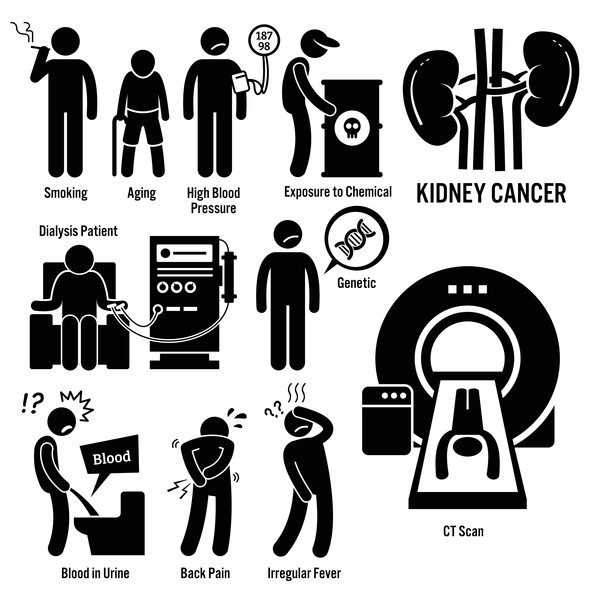Home » Kidney Cancer
Kidney Cancer
 About Kidney Cancer
About Kidney Cancer
Kidney cancer, or Renal cancer, begins when some of the cells that make up the inside of the kidney begin to grow uncontrollably. This abnormal growth creates a tumor, which is cancer.
The kidneys are a pair of organs that belong to the secretory system and are located in the back of the abdominal cavity. The key role of the kidneys is blood filtration, balancing the levels of salts in the body and body fluids as well as hormone production.
There are types of kidney cancer that grow slowly and even require little or no treatment, and there are aggressive types that can rapidly spread to other organs in the body and create metastases. This condition is defined as “metastatic kidney cancer” or “stage 4 kidney cancer.”
To improve patients’ chances, the American Society for Clinical Oncology, the ASCO, that includes various specialists in its panel, such as oncologists and radiologists, guides oncologists to inform cancer patients in all topics related to clinical trials in every stage of their disease.
The National Cancer Institute, the NCI, of the United States, stresses that for kidney cancer patients, joining one of the many clinical trials around the world might increase the chances of treatment success over the standard protocols.
Types of Kidney Cancer
- Renal cell carcinoma, RCC, in most cases, in 90% of cases.
- Tumor transplantation cells, for example, the Transient Cell Cancer, TCC, are present in about 10% of cases.
- Wilms’ tumor, a type of nephroblastoma, is the most common malignant kidney tumor in children, mainly aged 15-19, and probably the source is genetic mutations, such as WT1, WT2, WTX.
Disease Causes
- Smoking
- Older people
- High blood pressure
- Exposure to chemicals
- Dialysis patients
- Genetic
Disease Symptoms
- Blood in urine
- Lower back and / or waist pain
- Fever and / or weakness
- Weight loss
- Decrease in appetite

Kidney Cancer Treatment Goals
The main objective of treatment is to slow down and control disease progression and help to reduce symptoms.
For metastatic stage 4 patients the primary objectives are to prolong life and improve quality of life.
Standard Treatments
Active Surveillance
Surveillance is used in the case of older people who do not have symptoms or other illnesses that do not require any treatment.
On active follow-up, patients are given certain exams and tests to see if the cancer is growing.
These patients will not receive treatment until symptoms appear. It will often be sufficient to treat the symptoms and improve the quality of life.
When the cancer begins to grow, treatment can be done with the goal of being fully cured.
Surgery for Mastectomy
The goal is to remove the tumor and the margin around it. The lesion will be examined under a microscope to identify and diagnose the specific cancer type.
Two main types of treatment may be offered to patients before and after surgery
- Treatment prior to surgery is known as ‘Neoadjuvant’
Usually this stage of treatment will involve chemotherapy and/or radiotherapy intended to reduce the tumor’s size and improve the success of surgery.
- Post-surgery treatment, also known as ‘Adjuvant’
This treatment seeks to cure and prevent the appearance of metastases or recurrence of the tumor.
Colon cancer, when metastasized is categorized as stage 4, is considered inoperable.
Radiotherapy
This involves use of radiation at higher levels of energy aims to kill the cancer cells remaining in the post-operative area.
Radiation may also cause decelerated growth of the localized tumor remaining in the area, or local recurrence.
In many cases, neoadjuvant radiation will be used to shrink and reduce the tumor.
Chemotherapy
Chemotherapy is a medicated therapy which aims to shrink and erase cancerous cells and allow control over the disease.
Chemotherapy carries serious side effects, while its effectiveness is insufficient.
Chemotherapy’s impact has a range of side effects such as hair loss, loss of appetite, changes to bowel movements, fatigue, infection, hemorrhaging, incontinence, pain, and more.
Targeted therapies (per mutation or per protein)
A mutation is a change in the cell’s DNA sequence, the genetic code of the cell.
Mutations may occur when mistakes happen during the cell’s division process, or they may be caused by exposure to DNA harming agents such as free radicals, asbestos and others. At times healthy cells mutations may cause the generation of cancer in the body.
Examples of targeted therapies:
Kinase inhibitors
mTOR Inhibitors
- Torisel®, Temsirolimus
- Afinitor®, Everolimus
Anti Angiogenesis
Cancer tumors survive and thrive in the body by causing the body to produce a system of blood vessels around them that nourishes them and provides them with oxygen.
Anti – angiogenesis agent is a biological antibody which harms the cancerous tumor capability to induce blood vessels growth around it from the environment where it is located, to nourish it so it continues to grow and proliferate.
In this way the tumor is “starved” to death.
Examples of anti-angiogenesis drugs:
• Avastin® (Bevacizumab)
Immunotherapy
Immunotherapy drugs assist the immune system in attacking the tumor. This type of treatment is very different from chemotherapy, for example, which directly attacks the cancerous cells but unfortunately also damages healthy tissues.
The immune system has “immune barriers” which serve to regulate the immune system and prevent it from attacking the body. In cancer these functions are readily activated and as a result, the immune system ceases to attack cancerous cells, enabling the tumor to grow and proliferate in the body.
Barriers known as PD-L1, PD-1 and CTLA-4 are found on T-cells and cancer cells. Immunotherapy is a revolutionary strategy, and one of the most widely studied worldwide for its application to numerous types of cancer and various stages of the disease’s development. Treatment is generally provided in the form of an intravenous infusion.
Examples of Immunotherapies:
- Opdivo®, Nivolumab
- Yervoy®, Ipilimumab
- Keytruda®, Pembrolizumab
- Interleukin-2, IL-2
- Interferon-alfa

Advanced Cancer Drugs, Breakthrough Treatments and Clinical Trials from Around the World for Kidney Cancer
Facts
- The existing therapies used on stage 4 metastatic kidney cancer are not curative, and this is a source to the need for innovative and effective treatment strategies in order to fight the disease.
- The National Cancer Institute, NCI, highlights the fact that for a certain group of kidney cancer patients, the best treatment option is to join one of the many clinical trials existing worldwide aiming to increase their chances of therapeutic success.
- Currently, every patient will be offered the standard protocols described above. Sometimes the oncologist may suggest integrating these therapies with trials carried out in the institute.
The Opportunity
- Advances in cancer therapies may be found in clinical trials prescribing cutting edge, innovative drugs, some of which have already been recognized by the US Food & Drug Administration, the FDA, as “breakthrough drugs” and require further information to be approved.
- An entire world of clinical trials, Compassionate drugs and advanced new cancer treatments are available worldwide.
- It is important to know and have access to cutting edge cancer treatments that best match the unique medical condition of the patient and increase chances in winning the fight against compared to the standard care offered.
Note to remember!
Not every patient is eligible to enter a specific clinical trial. The eligibility conditions must be fully met and each case is reviewed separately to ensure that the clinical trial matches to the specific cancer patient and vice versa.
References:
ttps://www.fda.gov
https://www.ema.europa.eu
https://www.health.gov.il
https://www.cancer.gov
https://www.cancer.org
https://www.cancerresearchuk.org
https://www.cancercenter.com
Dear Reader
This information is provided as a source of knowledge and does not constitute a medical consultation. For professional medical advice, see your attending physician. Information regarding drugs and commercial names belongs to the pharmaceutical companies
To check if our service suits your case
We need to talk

Improve therapeutic outcomes, prolong life and quality of life, are our main business.
We support access to and expand cancer treatments beyond the standard of care, with the most advanced and innovative treatment options in the world, personally matching the individual cancer patient’s medical condition and with the support of top tier oncologists.
Article categories
קטגוריות המאמרים
Popular topics









